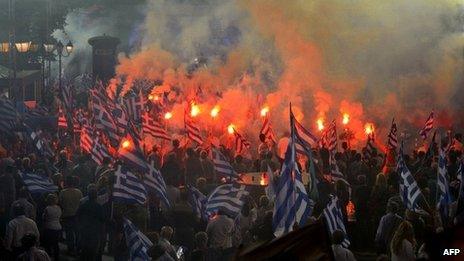Campaigning ends ahead of crucial Greek elections
- Published

Huge rallies were held in the capital, Athens, in a last-minute effort to win votes
Campaigning in Greece has ended ahead of a crucial election on Sunday which could determine its future in the eurozone.
At a final rally, the head of the conservative New Democracy Party billed the vote as a choice between keeping the euro and returning to the drachma.
Rival party Syriza says it wants to stay in the euro, but opposes the terms of an international bailout.
Unofficial polls have put the two parties neck and neck.
Sunday's vote is being watched around the world, amid fears that a Greek exit from the euro could spread contagion to other eurozone members and send turmoil throughout the global economy.
The election, the second in six weeks, was called after a vote on 6 May proved inconclusive with no party or coalition able to form a government.
'Brussels, expect us'
On Friday, the head of New Democracy, Antonis Samaras, told supporters he would lead the country out of the financial crisis, while keeping the country part of the eurozone.
Mr Samaras broadly accepts Greece's international bailout, but says he will renegotiate the terms of the agreement to seek a better deal for Greeks.
"We will exit the crisis; we will not exit the euro. We will not let anyone take us out of Europe," he told a rally in front of parliament in Syntagma Square.
"If we were to come into conflict with our partners today [over the bailout] they would force us to leave the euro. We wouldn't be able to import anything, we would literally lose everything and in the end we would have to agree to terms with much worse conditions in order to secure the bare necessities."
Many Greeks are unhappy with the harsh austerity conditions attached to two bailout deals which have been keeping Greece from bankruptcy.
Mr Samaras also said he could lead a coalition of other centre-right parties and the Socialist Pasok party, which has a similar stance.
Mr Samaras' main rival is Alexis Tsipras, the youthful head of the left-wing Syriza party, who rejects the bailout while insisting that he wants Greece to stay in the eurozone.
"The memorandum of bankruptcy will belong to the past on Monday," he told supporters in Omonia Square at a final rally on Thursday.
"Brussels expect us, we are coming on Monday to negotiate over people's rights, to cancel the bailout."
Pointing to the huge bank loan package deal between the EU and Spain on Sunday, he argued that a bailout was possible without the kind of drastic cuts demanded of Greece.
"Spain negotiated and succeeded in taking financial support without a fiscal consolidation package, despite the lenders' threats and blackmail," Mr Tsipras said.
The BBC's Europe editor, Gavin Hewitt, says the vote is likely to leave big questions for Europe's leaders when they meet for an EU summit at the end of the month in Brussels.
Germany, which has the eurozone's most powerful economy, insists Greece, like other member-states which have received international bailouts, must abide by the austerity conditions.
Chancellor Angela Merkel was one of several European leaders who took part in a video conference on Friday ahead of a G20 summit, starting in the Mexican resort of Los Cabos on Monday, which is set to be dominated by the eurozone crisis and the aftermath of Sunday's Greek election.
A spokesman for British Prime Minister David Cameron said he had taken part in the call with the leaders of Italy, Spain, Germany and France, and they had agreed to "secure global economic stability and to support growth".
There were some tensions between French President Francois Hollande and Mrs Merkel, Reuters news agency reported.